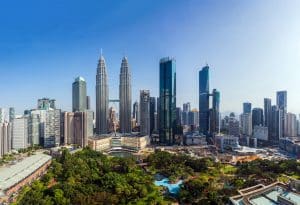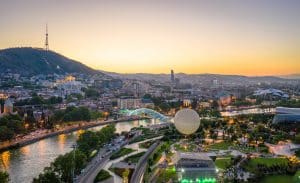Work and Wander in Asia: Digital Nomad Visas for Long-Term Stays
Asia has long been a popular destination for digital nomads due to the low cost of living, good safety record of many countries, public infrastructure when it comes to transportation, accommodation and health and just the general sense of adventure it offers over many other destinations. While Asia used to be synonymous with South East Asia there are other regions which may be even more attractive.
Regardless of where you head, visas remain one of the bigger challenges. Many countries lack specific visa digital nomad visa options. In the past, tourist visas were a common choice for digital nomads – but these come with uncertainty and compliance issues.
Fortunately, the situation has improved significantly in recent years. Several countries in Asia now offer specialized visas designed specifically for digital nomads. In this article, we’ll explore some of the most popular Asian countries offering digital nomad visas. Let’s dive in.
Thailand
Thailand has been a top choice for digital nomads worldwide for a decade. In fact, Chiang Mai, a city in the northern part of Thailand, has been called the capital city of digital nomads. And if you walk into any of the dozens of coworking spaces there, you can certainly see why.
In 2024, Thailand released its first digital nomad visa, known as the Destination Thailand Visa, or DTV for short. In our opinion, it’s one of the world’s best digital nomad visas for many reasons:
- Low requirements: It’s specifically designed for remote workers and digital nomads, but not exclusively so. You can even take Muay Thai training and get this visa.
- Long duration of stay: You can stay in Thailand for up to 5 years with it.
- Multiple-Entry Visa: The DTV visa is a multiple-entry visa. This means you can fly in and out of Thailand as many times as you want while your visa is active.
To get the Destination Thailand Visa, there are only two main requirements:
- Financial Proof: You need to have THB 500,000 or the equivalent in your bank account.
- Purpose of Visit: There are two options to show your purpose of visit:
a) Proof of Remote Work: You need to provide evidence of your remote work portfolio (letter from your employer, incorporation documents, etc.)
b) Soft Power: You need to participate in activities such as Muay Thai training, cooking classes, music festivals, or even receiving medical treatment in Thailand.
In addition, depending on where you live, the Destination Thailand Visa application process can be completed 100% online. All you need to do is visit the official Thailand E-Visa website, create an account, and upload your documents.
For more information, you can read this guide to the Destination Thailand Visa.
For a full list of requirements and documents you need, refer to the Thailand E-Visa website.
Malaysia
While it’s not as popular as Thailand, there are many great cities for digital nomads in Malaysia, such as Penang and Malacca. Both are UNESCO World Heritage Sites with a laid-back lifestyle. If you prefer a more cosmopolitan experience, Kuala Lumpur is an excellent option.
Malaysia offers a digital nomad visa called the DE Rantau Nomad Pass, which was introduced in 2022. The visa requirements are quite similar to Thailand’s DTV Visa, but there is an annual income requirement instead of financial proof.
Here are the main requirements:
- Tech Talent: For digital nomads or freelancers working in the tech industry, such as programmers, web designers, digital content developers, and more.
- Non-Tech Talent: For consultants, managers, or higher positions working for non-Malaysian companies but needing to stay in Malaysia.
Annual Income Requirements:
- Tech Talent: Minimum annual income of USD 24,000.
- Non-Tech Talent: Minimum annual income of USD 60,000.
The DE Rantau Nomad Pass allows you to stay in Malaysia for a maximum of two years:
- Initial validity: 3 – 12 months.
- Renewal: One renewal is permitted, granting an additional 12 months.
To learn more about the requirements or to start your application online, visit the official website: DE Rantau Nomad Pass.
South Korea
If K-pop, K-dramas, or Korean culture are your interests, you might definitely want to check out South Korea. The country released its digital nomad visa in January 2024, but the requirements are among the highest for digital nomad visas in Asia. It primarily targets remote workers.
You can apply for the South Korea F-1-D visa at any South Korean embassy or consulate worldwide. It’s also possible to apply directly from within South Korea.
To get the F-1-D visa, there are three main requirements:
- Annual Income: You must have an annual income that is at least twice the country’s GNI per capita from the previous year. In 2024, the minimum income required is KRW 88 million, which is approximately US$66,000.
- Employment: You must have worked for an international company for at least one year within the same industry.
- Health Insurance: You need private health insurance with coverage of at least KRW 100 million (~US$76,000). You can use ACS Globe Traveller for this.
For more information, visit the South Korea MOFA website: MOFA Digital Nomad Visa.
If the visa requirements are too high, you might want to check out the Working Holiday Program (H-1 Visa). However, it’s not specifically a digital nomad visa.
Georgia
Georgia is a unique country for digital nomads in Asia. It has some amazing hiking opportunities, mountains, beaches and offers fantastic food. Peaches and wine have always been my favorite here. Given that few major airlines fly to Tbilisi, it’s a lot less touristy than Malaysia or Thailand.
Georgia was one of the very first countries to offer a one year visa for pretty much everyone. The digital nomad visa in Georgia is also appealing. Called “Remotely from Georgia,” it is available to nomads, freelancers, remote workers, and even business owners, as long as they can prove their ability to work remotely from Georgia.
The visa comes with four main requirements:
The main downside is that the visa only allows you to stay in Georgia for one year.
- Financial Requirements:
- A minimum monthly income of USD 2,000.
- Proof of savings of USD 24,000.
- Proof of Remote Work: Employment contracts, freelancer agreements, or similar documentation.
- Health Insurance: You must have health insurance or travel insurance thoughout your stay. We recommend ACS Globe Traveller. It’s an affordable choice and comes with up to EUR500,000 coverage on medical expenses.
- Citizenship: Only citizens from approximately 95 countries are eligible, including the USA, UK, Canada, and EU countries (list of eligible countries).
Applications can be submitted online through the Georgia E-Visa portal. For more details, visit the Ministry of Foreign Affairs of Georgia website.
UAE
Maybe surprising to some, the United Arab Emirates (UAE) is considered part of Asia. The country offers a unique visa for digital nomads and remote workers: The “Virtual Work Residence Visa,” often referred to as the Dubai Digital Nomad Visa. With this visa, there is no personal income tax in the UAE, even if you become a tax resident.
The UAE is definitely more of a destination for digital nomads for whom the business side of things (okay, taxes) are a big part of the move abroad.
There are three main requirements for the Virtual Work Residence Visa:
- Employment Contract: The visa is available to anyone with a minimum one-year contract with a company outside the UAE. This can even be your own company.
- Minimum Income: You must have a minimum salary of USD 3,500 per month.
- Health Insurance: You need to have health insurance throughout your stay.
Similar to Georgia’s digital nomad visa, the Dubai Digital Nomad Visa allows you to stay in the country for a maximum of one year. If you want to stay longer, it’s worthwhile considering moving your residency or at least becoming an expat in the UAE.
The application can be completed online through the Invest in Dubai website. Please note that there is a non-refundable fee of USD 287, and it can take up to 60 business days for visa approval. Plan your time accordingly.
Final Thoughts
Being a digital nomad in Asia is a once-in-a-lifetime opportunity. It offers complete freedom. You can work anywhere you want, travel to any destination without restrictions, and enjoy a better lifestyle at a fraction of the cost compared to back home.
In addition, as more countries introduce digital nomad visa programs, it’s becoming easier to live as a digital nomad in Asia. It’s expected that more countries in the region will launch their own digital nomad visas in the future. For example, there are reports that the Philippines and Indonesia are planning to release their own digital nomad visa programs soon.
Finally, no matter where you are, having health insurance is always a good idea. It’s not just only about meeting visa requirements. It’s a lifesaver when you need it most. In case you need health insurance, we can help with that. You can get a quote directly on this page.






